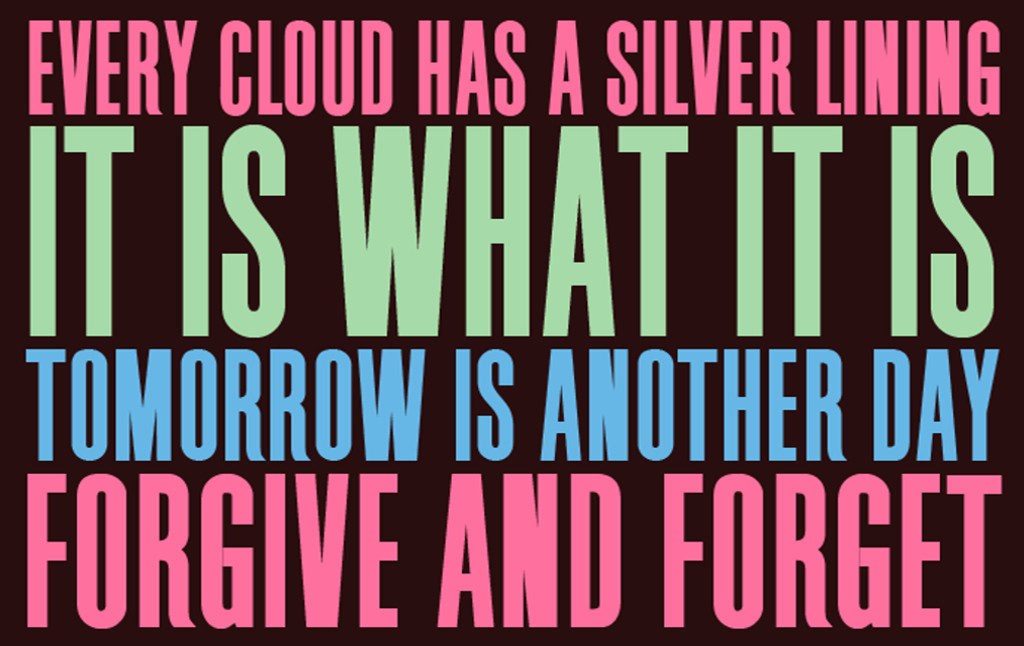Platitudes are common phrases that oten lack depth or originality, and are frequently used in everyday conversations. They can be found in various aspects of life, from personal relationships to politics and sports. One such example of a platitude is the phrase “good things come to those who wait.”
This phrase suggests that if someone is patient and waits long enough, they will eventually be rewarded. While this may be true in some cases, it offers little practical advice or meaningful insight. In fact, it can be argued that waiting around for something to happen is not always the best course of action.
Furthermore, the platitude “good things come to those who wait” ignores the importance of taking action and working towards one’s goals. It implies that success will simply fall into one’s lap if they are patient enough, which is not always the case. Success often requires hard work, dedication, and persistence, rather than simply waiting for things to happen.
This platitude also fails to acknowledge the role of luck and external circumstances in achieving success. Sometimes, despite our best efforts, things do not work out the way we want them to. In these situations, waiting patiently may not be the best option, and it may be necessary to reassess our goals and take a different approach.
Ultimately, while the phrase “good things come to those who wait” may offer some comfort in uncertain times, it is not a reliable guide to success or fulfillment. Taking action, working hard, and staying persistent are more effective ways to achieve our goals and find success in life.
Common Platitudes
Common platitudes are overused statements or phrases that are meant to convey a general sense of wisdom or advice. They are often used in everyday conversations, motivational speeches, or self-help books. Some common examples of platitudes include “practice makes perfect,” “follow your dreams,” “time heals all wounds,” and “hard work pays off.” While these statements may have some truth to them, they are often oversimplified and can be seen as cliché or unhelpful. Despite this, platitudes are still commonly used as a way to offer encouragement or guidance to others.

The Impact of Speaking in Platitudes
When someone speaks in platitudes, they tend to use simple and cliché phrases that lack depth and originality. These phrases are often used to express common sentiments or opinions that are widely accepted, but provide little insight or value to a conversation. For example, saying “everything happens for a reason” or “follow your heart” can be considered platitudes because they are generic statements that do not offer any specific advice or information.
People may use platitudes for a variety of reasons, such as to fill silence, to express empathy, or to appear wise or knowledgeable. However, relying too heavily on platitudes can make a person seem unoriginal or insincere, especially in situations where more thoughtful and nuanced communication is necessary.
In order to avoid speaking in platitudes, it can be helpful to take the time to think about what you want to say and how you can express it in a more meaningful way. This may involve usng specific examples, sharing personal experiences, or offering practical advice. By doing so, you can engage in more meaningful conversations and build stronger connections with those around you.
The Meaning of Platitude
Platitude is a noun that refers to a statement or remark that is trite, banal, or unoriginal. It is a phrase or expression that has been overused and lacks freshness or originality. Platitude often conveys a lack of thought or creativity and is considered to be a sign of a lack of imagination. It is typically viewed as a negative quality in writing, speech, or communication as it fails to engage the audience and is unlikely to make a lasting impact. Examples of platitudes include “actions speak louder than words” or “time heals all wounds.”
The Use of ‘Thank You’ as a Platitude
“thank you” can be considered a platitude if it is used in a thoughtless or routine manner without any genuine emotion or gratitude behind it. When someone uses “thank you” as a reflexive response without any sincere appreciation, it can come across as empty or meaningless. However, when “thank you” is said with genuine gratitude and appreciation, it can be a powerful and meaningful expression of thanks. So, whether “thank you” is a platitude or not depends on the sincerity and authenticity behind the words.
The Meaning of Platitude
A good sentence for platitude could be “The politician’s speech was filled with empty platitudes that failed to inspire or offer any real solutions.” This sentence highlights how platitudes are often vague or overused statements that lack meaningful substance or impact. It shows how using platitudes can be seen as a sign of insincerity or a lack of original thought. In general, a good sentence for platitude should demonstrate an understanding of what platitudes are and how they can be ineffective or even detrimental in communication.

The Meaning of Spiritual Platitudes
Spiritual platitudes are commonly used phrases or teachings that have become so overused and repeated that their original meaning has been lost or distorted. These platitudes often sound wise and comforting, but they lack depth and can sometimes even be harmful. Examples of spiritual platitudes include “everything happens for a reason,” “just let go and let God,” or “everything will work out in the end.” While thee phrases may provide temporary comfort, they can oversimplify complex issues and invalidate someone’s feelings or experiences. It’s important to be aware of spiritual platitudes and strive to understand the true meaning behind them, rather than simply accepting them at face value.
Alternatives to Platitudes
If you are looking for alternatives to platitudes, there are several options that you can choose from. For instance, you can use specific and unique language to express your thoughts and feelings. Instead of uing general statements or overused phrases, you can try to be more precise and descriptive in your language.
You can also try to be more creative with your expressions by using metaphors, analogies, or other literary devices. This can help you convey your message in a more engaging and memorable way.
Another approach is to focus on authenticity and honesty. Instead of relying on stock phrases or cliches, you can speak from the heart and share your own personal experiences and insights. This can help you connect with others on a deeper level and build more meaningful relationships.
Ultimately, the key to avoiding platitudes is to be intentional and thoughtful in your communication. By choosing your words carefully and speaking with sincerity, you can express yourself in a way that is both genuine and impactful.
The Meaning of a Vague Platitude
A vague platitude is a statement or phrase that is overly general and lacks specific details or meaning. These types of expressions are often used to convey a positive sentiment or message, but they do not provde any real substance or practical advice. Vague platitudes can be found in many different contexts, such as in personal conversations, motivational speeches, or advertising. Examples of vague platitudes include phrases like “follow your dreams,” “be yourself,” or “everything happens for a reason.” While these statements may sound inspiring or uplifting, they do not offer any concrete guidance or actionable steps for achieving goals or overcoming challenges.
Opposite of Platitude
The opposite of platitude can be described as a term or expression that is unique, fresh, and original in its meaning or usage. Such a term or expression may be less commonly known or used, but it carries more weight and significance due to its novelty and specificity. Some possible examples of opposites of platitudes include coinages, which are newly invented words or phrases; nuances, which are subtle and distinctive variations in meaning; buzzwords, which are fashionable terms that are currently popular in a particular field; and neologisms, which are newly coined words that reflect chnges in society or technology.

The Problem of Overused Phrases
An overused phrase is commonly referred to as a cliché. A cliché is a term or expression that has been used so frequently that it has lost its originality and impact. Clichés can be found in vrious forms of communication, including literature, films, advertising, and everyday speech. They are often seen as a sign of lazy writing or lack of creativity, as they do not offer any original or interesting insight. Due to their overuse, clichés can also be seen as annoying or even offensive to some readers or listeners. Therefore, it’s best to avoid using clichés in writing and instead strive for originality and creativity.
Do Narcissists Show Gratitude?
Narcissistic individuals may have difficulties sying thank you or expressing gratitude, as this requires acknowledging and appreciating the contributions and efforts of others. Narcissism is a personality disorder characterized by a preoccupation with oneself, a lack of empathy, and a sense of entitlement. As a result, individuals with narcissistic personalities may struggle with recognizing the value of others and may view their own accomplishments as superior to those of others, making it challenging for them to express gratitude. However, it’s important to note that not all narcissistic individuals will display the same behavior, and some may still be able to express gratitude in certain situations. an inability to say thank you or express gratitude is considered a common trait among people with narcissistic personalities.
Expressing Gratitude in the Most Elegant Way
The fanciest way to express gratitude is by uing formal and sophisticated language to convey your appreciation. Some examples of such expressions are “Please accept my most sincere and heartfelt thanks,” “I am deeply indebted to you for your invaluable assistance,” or “Your exceptional kindness and generosity have left me speechless, but I must express my profound gratitude.” Additionally, using elevated vocabulary, such as “grateful,” “appreciative,” or “indebted,” can add a touch of elegance to your thank-you message. However, it is essential to keep in mind the context and audience while using such language, as it may come across as insincere or pretentious in certain situations.
Conclusion
A platitude is a statement or comment that is obvious, unoriginal, and lacks any real meaning or emotional weight. These types of statements are often used by speakers and writers who want to fill space or sound profound without really saying anything meaningful. While platitudes may be well-intentioned, they are generally received as dull, insipid, or banal. It is important for individuals to be aware of when they are using platitudes, especially in situations where they are trying to convey a message or connect with an audience. By avoiding platitudes and striving for original, thoughtful statements, individuals can communicate more effectively and make a lasting impact on their audience.
